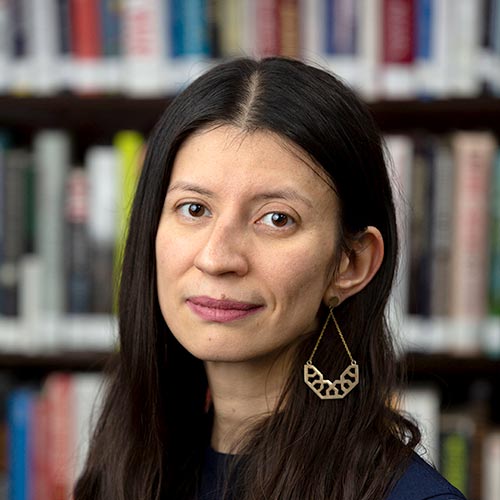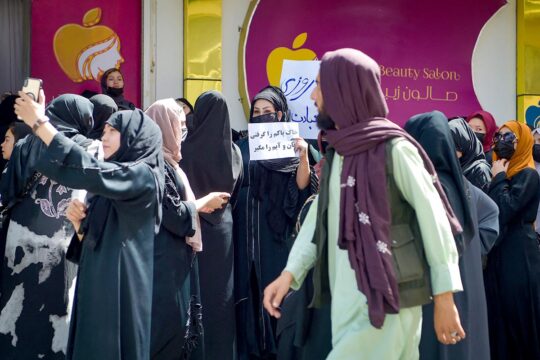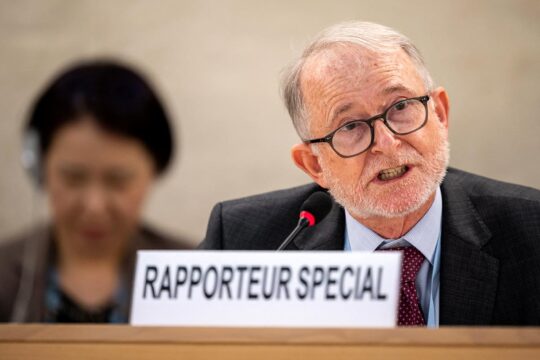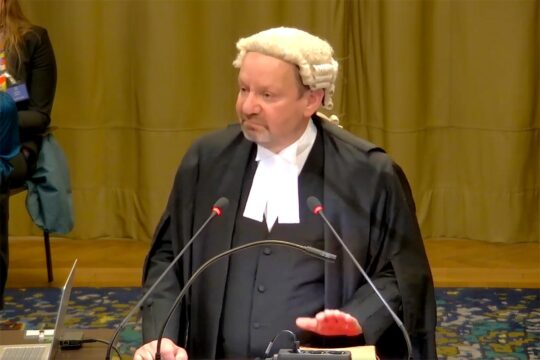On July 8, the International Criminal Court (ICC) announced that two arrest warrants have been issued for the Taliban’s leader Hibatullah Akhundzada and Chief Justice Abdul Hakim Haqqani. The news created a glimmer of hope in the midst of the horrific human rights and women’s rights situation in Afghanistan and the increasing normalization of the Taliban in the region and beyond. Just in the days before the warrant, Russia became the first country to recognize the Taliban’s government. This was a devastating development for women of Afghanistan who have been asking for non-recognition of the Taliban due to the ongoing gender apartheid. The ICC news also came as the Iranian government launched a massive campaign of forced deportation of Afghans, including women and girls. Afghanistan is fading from the public memory around the world while the Taliban are being normalized despite their brutal policies. Along with this normalization, more and more countries, including the US and Germany are planning to expel and deport Afghans. In this context, the issuance of the arrest warrants was a stark reminder of the ongoing gender persecution in Afghanistan.
Afghans have been waiting for the ICC for a very long time. Afghanistan acceded to the Rome Statue in 2003 after the US and its allies toppled the Taliban who had first come to power in 1996. The court opened a preliminary investigation in 2006. It was only in 2017 that the then prosecutor Fatou Bensouda requested authorization to initiate a formal investigation into war crimes and crimes against humanity of the various parties in the case of Afghanistan. The parties included the United States Military and Central Intelligence Agency (CIA) for crimes of torture. In response, in September 2020, the US government and President Trump imposed sanctions on the ICC Prosecutor. While the Biden administration removed the sanctions, new hurdles emerged. The Afghan government requested a deferral of the investigation in 2020. When the Taliban came back to power in August 2021, the deferral was already in place. In 2023, the Prosecutor announced the resumption of the investigation, albeit with a narrowed focus on the Taliban and the Islamic State Korosan Province (ISKP, a regional branch of IS that is at war with the Taliban), leaving out the alleged perpetrators of the former Afghan republic as well as the allegations of crimes by the US and other international forces in Afghanistan, with conflicted responses and an outcry about double standards.
What do the warrants really mean?
The arrest warrants for Akhundzada and Haqqani are unlikely to lead to trial and justice in the near future. The Taliban have dismissed the announcement, stating that they do not recognize the court. These particular Taliban leaders don’t travel beyond Afghanistan, with the Taliban Supreme Leader, Akhundzada, being very reclusive. At this stage, the value of the warrants is symbolic, and perhaps in the most ambitious scenario, to some extent preventive. There are tensions within the Taliban regarding their vision for Afghan state. Some senior leaders of the Taliban have shown more appetite and ambition for recognition and normalization of their relationship with the region and beyond. The arrest warrants could send a message to them that with the ongoing gender persecution, they could be next in the ICC list, impacting their own ability to travel and engage at the global stage. The arrest warrants are unlikely to turn the Taliban Supreme Leader into a liability in the current climate, but if the internal politics and dynamics within the group shift, it can become another leverage for pressure/contention within the senior Taliban leadership. The other limiting factor of the ICC investigation is its narrow scope, with its focus on the Taliban and the ISKP. Afghanistan has been a site of crimes and serious violations for over 5 decades. The decision of the Prosecutor to de-prioritize other perpetrators has been explained as an issue of resources, as well as trying to focus on the most urgent, on-going crimes. However, the pressure from the successive US governments is also very likely a factor.
Afghan survivors and activists know that the current ICC investigation is insufficient in the face of past and ongoing crimes and violations. The Afghan human rights community continues to make calls for the ICC to broaden its current scope. In the meantime, they are pushing for other pathways to accountability that may be more comprehensive. In 2021, following a brutal attack on a girls’ school in Kabul, the Afghanistan Independent Human Rights Commission, of which I was the chairperson, called for establishment of a UN accountability mechanism for Afghanistan. Following the fall of Kabul to the Taliban, the UN Human Rights Council established a Special Rapporteur on Afghanistan in October 2021. It has made significant contributions to exposing the human rights abuses in Afghanistan, drawing international attention to the situation, creating a platform for engagement and submissions from the Afghan women across Afghanistan and the Afghan human rights community inside and outside the country. The Special Rapporteur has been relentless in his principled call for the restoration of rights of women and girls and human rights of all Afghans, calling out the “creeping normalization” of the Taliban. However, the gap in accountability still remains as the mandate is focusing primarily on the Taliban atrocities. It is also not set up to gather evidence to be utilized in universal jurisdiction and domestic and international courts, thus the call for a comprehensive accountability mechanism with a broader time-frame and evidence collection capacity.
Domestic efforts on other crimes
The call for a comprehensive mechanism has been slow to gather momentum among member states both due to the reluctance of some countries to have a mechanism that could potentially look into their own military’s conduct in Afghanistan, as well as the current financial crisis in the UN. The establishment of a strong, well-resourced comprehensive mechanism would complement and support the ongoing ICC investigation as well as the mandate of the Special Rapporteur sending a message to all victims of atrocities in Afghanistan that they are not “de-prioritized” or forgotten in an environment of eroding trust in international law and accountability and increasing display of double standards by Western leaders.
Another venue for accountability is through investigations by the different governments that had troops in Afghanistan. The current Afghanistan Inquiry in Australia is a prime example of this and another window for truth telling and possibly reparations for victims and survivors in Afghanistan. The investigation of allegations of war crimes and abuses by the Australian forces are ongoing and, in the meantime, the Australian government has set up a system for victims to make claims of compensation, the first such possibility offered to Afghan victims and survivors following the fall of Kabul to the Taliban. It is a more grim picture with some of the other governments who had troops in Afghanistan. In the UK, they have been several attempts at cover up of the atrocities committed by the British special forces in Afghanistan. Additionally, despite the very serious nature of allegations against American military and special forces, there is no near likelihood of investigation or accountability.
A People’s Tribunal in October
Another potential venue that is valuable primarily from a truth-telling perspective is the victim-centred platform of People’s Tribunals. The power of such tribunals come from their focus on victims and the freedom from the constraints mobilizing the political will of member states. Four Afghan civil society organizations are about to announce a People’s Tribunal focused on Women and Girls of Afghanistan under the auspices of the Permanent People’s Tribunal, with the hearing sessions to be held in early October in Spain. A People’s Tribunal, a civil society-led imitative, has the potential to expand to cover more allegations and perpetrators, giving victims of all atrocities a “day in court”.
Afghanistan is currently the world’s worst women’s rights crisis. The Taliban’s oppression of women must not be met with impunity and silence. A comprehensive approach to justice does require addressing root causes and a longstanding culture of impunity that partly damaged the international community’s credibility on justice and contributed to the Taliban’s return. However, this is the merit at least of the ICC announcement, symbolic as it is, to keep gender apartheid in Afghanistan under the spotlight.

Shaharzad Akbar is the Executive Director of Rawadari, a human rights organization focused on Afghanistan. Currently in exile, she is the former Chairperson for Afghanistan’s Independent Human Rights Commission. In addition to leading Rawadari, she is currently a Honorary Fellow of Wolfson College, University of Oxford. Her writing has appeared in The Washington Post, Foreign Affairs, Al Jazeera and other international outlets.







